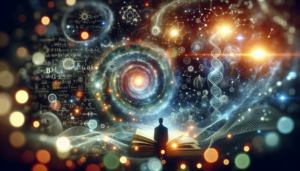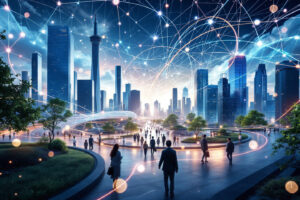You wake up in a new place. The language is unfamiliar, the customs feel strange, and even simple gestures like smiling, bowing, shaking hands carry meanings you don’t quite understand. But here’s the catch: to them, you’re the one who is different.
What we call “reality” isn’t as objective as we think. Culture filters what we see, how we react, and even what we believe is possible. The way we perceive love, ambition, morality, and even the passage of time isn’t hardwired, it’s learned. And that means it can be different elsewhere. Radically different.
Everything we consider natural like our emotions, our beliefs, even our instincts are not universal, but something shaped entirely by the culture we live in?
The Operating System of Life
Culture isn’t something we put on like a jacket; it’s the invisible force shaping how we think, what we value, and even how we process emotions. It tells us what is polite and what is rude, what is sacred and what is trivial, what is right and what is absurd. It’s the reason some cultures value silence in conversation while others see it as uncomfortable. It’s why success in one society means wealth and power while in another, it means harmony and community.
Culture molds even the most personal parts of our lives. Think about love: is it an uncontrollable feeling that takes over, or is it a practical partnership built on duty and shared responsibility? Your answer depends entirely on the culture you were raised in.
“What seems obvious is just what we’ve been taught to see.”
The Hidden Language of Culture
Symbols are culture’s secret code. A flag is more than fabric; it’s identity. A handshake is more than a contact; it’s trust, power, or submission, depending on how it’s done. A wedding ring isn’t just metal; it’s a promise, a boundary, a social contract. The same symbol can carry wildly different meanings depending on where you are.
A simple example? Nodding means “yes” in many places but in some cultures, it means “no.” What could be more basic than a yes-or-no answer? Yet even that is culturally constructed.
“Culture is a mirror that reflects the meanings we agree upon.”
Language: The Framework of Thought
Language doesn’t just describe reality; it constructs it. In some cultures, colors are more than just visual shades, they represent emotions, social status, even morality. Some languages have no word for “guilt,” while others have multiple words for different types of longing. If a language lacks a word for a concept, does that concept feel less real to its speakers? And if a language has a dozen ways to express something, does that mean they experience it more deeply?
In some Indigenous languages, people don’t say “I own this land.” Instead, they say, “This land holds me.” One phrase suggests possession; the other suggests belonging. That difference in language reflects a completely different way of understanding the relationship between humans and nature.
“The words we use don’t just express our thoughts; they shape them.”
Rituals: More Than Just Tradition
Rituals aren’t just routines, they’re meaning factories. A wedding isn’t just about two people coming together; it’s a statement about love, family, and society. A funeral isn’t just about mourning; it’s a way of defining life and death itself. Rituals carve structure into human experience, turning ordinary events into something sacred, something remembered.
Why do we blow out candles on a birthday cake? Why do we throw rice at newlyweds? Many rituals seem meaningless until we realize they are cultural markers, the silent messages passed down through generations, reinforcing what we value and believe.
Is There a Universal Human Nature?
The Myth of the Unchanging Human
For centuries, scholars believed in a fixed human nature, the one that is rational, predictable, and universal. But the more we study different societies, the more we realize that human nature is fluid, shaped by the meanings each culture assigns to the world.
Take emotions. We assume emotions are universal that love, grief, anger, and joy are felt the same way everywhere. But even emotions are shaped by culture. In some societies, anger is seen as a private emotion, while in others, it is a public display of strength. Happiness in some cultures is about personal success; in others, it is about collective well-being.
“What we feel is not just biology, it’s belief.”
Space, and Reality Itself
Some cultures rely on directions like north, south, east, and west rather than left and right, meaning they are always oriented to the landscape around them. Others describe space not in terms of physical distances but through relationships proximity to family, to sacred places, or even to natural elements like rivers and mountains. If even the way we map out space is shaped by culture, what does that say about how we experience the world?
Why This Matters: The Power of Perspective
Bridging Cultural Divides
Understanding culture isn’t just about travel or anthropology, it’s about navigating life in an increasingly interconnected world. Misunderstanding cultural differences leads to conflicts, but recognizing them builds bridges. The more we grasp how others see the world, the better we understand our own place in it.
“The greatest barrier to understanding is assuming everyone thinks like you.”
Cultural Diversity Is a Strength, Not a Threat
In a world that often pushes for uniformity, cultural diversity is an asset. Different ways of thinking produce new solutions, new ideas, and new ways of being human. Losing cultural diversity is not just a loss of customs, it’s a loss of perspectives, of ways of understanding existence itself.
Questioning Our Own Reality
The most powerful thing about studying culture? It forces us to question what we take for granted. What if what we call “normal” is just habit? What if what we consider “right” is just tradition? The moment we start seeing culture for what it is constructed, evolving, deeply embedded, we gain the freedom to think beyond it.
“To understand culture is to step outside of it, if only for a moment.”
Final Thoughts
Culture is not just something we observe, it’s something we are embedded in. It shapes what we value, what we believe, and even what we think is real. But by becoming aware of its influence, we gain the ability to question, adapt, and see the world more clearly.
We are not just products of our cultures; we are also creators of them. And that means we have the power to shape new ways of thinking, new ways of seeing, and new ways of being human.



